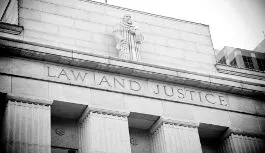Criminal Law
In-depth discussion of common crimes and possible defenses. Explanation of defendants' constitutional rights, description of the process from arrest to trial and beyond, overview of the juvenile justice system, and more.
-
Invoking Your Right to Remain Silent
You've seen it time after time on shows and in the movies: Cops slapping the cuffs on a "perp" and reading them their rights. But does it always happen that way? And can your silence actually be used against you sometimes?
-
Miranda Rights: What Happens If the Police Don't Read You Your Rights
Many people believe that if they are arrested and not "read their rights," they can escape punishment. Not true.
-
Bail: Getting Out of Jail After an Arrest
Bail is cash, a bond, or property that an arrested person gives to a court to ensure that he or she will appear in court when ordered to do so.
-
How Innocent Defendants Handle Criminal Charges
Even the most well-intentioned prosecutors file charges against innocent suspects occasionally. Other than going to trial, how can innocent defendants avoid trial, a guilty plea, or verdict?
-
Do I Need a Lawyer When I'm Charged With a Crime?
Defendants charged with crimes are almost always best served by obtaining a lawyer.
-
Access to Police Disciplinary Records for Criminal Defendants
State laws vary on whether police misconduct or disciplinary records are confidential, restricted, or public. Even when public, finding complaints against officers can be a difficult task.
-
The Prohibition Against Double Jeopardy
The Fifth Amendment to the U.S. Constitution provides that no person shall “be subject for the same offence to be twice put in jeopardy of life or limb.”
-
Disorderly Conduct and Public Intoxication
Disorderly conduct (also called "disturbing the peace" in some states) is a crime that usually involves some kind of offensive or disruptive public activity.
-
What Is Manslaughter? What Is Murder vs. Manslaughter?
Manslaughter is an unlawful killing that doesn’t involve malice aforethought—intent to seriously harm or kill, or extreme, reckless disregard for life. The absence of malice aforethought means that manslaughter involves less moral blame than either first- or second-degree murder.
-
Expunging or Sealing an Adult Criminal Record
Depending on the crime and your progress in your sentencing, you may be able to seal arrest or conviction records.
-
The juvenile justice system is separate from the criminal justice system. Read on to learn some basics on crime and punishment for minors.
-
Sealing Juvenile Court Records
Former juvenile offenders may be able to get a fresh start of sorts by filing a petition in court seeking expungement or sealing of their juvenile records.
More About This Topic
More Legal Topics
- Bankruptcy
- Business Formation: LLCs & Corporations
- Car Accidents
- Debt Management
- Disability Law
- Divorce & Family Law
- DUI / DWI & Traffic Tickets
- Employment Law
- Foreclosure
- Immigration
- Landlords & Tenants
- LGBTQ Law
- Nonprofits
- Patent, Copyright & Trademark
- Personal Finance
- Personal Injury
- Real Estate & Rental Property
- Renters' & Tenants' Rights
- Small Business
- Small Claims Court & Lawsuits
- Social Security & Retirement
- Taxes
- Wills, Trusts & Probate
- Workers' Compensation Laws
- Bankruptcy
- Business Formation: LLCs & Corporations
- Car Accidents
- Debt Management
- Disability Law
- Divorce & Family Law
- DUI / DWI & Traffic Tickets
- Employment Law
- Foreclosure
- Immigration
- Landlords & Tenants
- LGBTQ Law
- Nonprofits
- Patent, Copyright & Trademark
- Personal Finance
- Personal Injury
- Real Estate & Rental Property
- Renters' & Tenants' Rights
- Small Business
- Small Claims Court & Lawsuits
- Social Security & Retirement
- Taxes
- Wills, Trusts & Probate
- Workers' Compensation Laws
